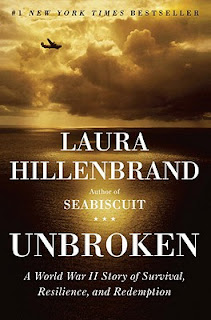 Unbroken: A World War II Story of Survival, Resilience, and Redemption, by Laura Hillenbrand
Unbroken: A World War II Story of Survival, Resilience, and Redemption, by Laura HillenbrandI have to start with a confession: I do not know how to blog about Unbroken. It's an intense book, and I've had an emotionally intense month. What's more, I'm on the planning team for an upcoming Veterans' Day event, so questions of combat, trauma, etc. are already in my brain.
But here I go. If you choose to read on, please give me grace.
Unbroken tells the story of Louis Zamperini, an Olympic runner who became a bombadier in WWII and ended up as a POW in Japan. What he went through in captivity could not be more accurately described than "hell." A better title for this book would have been Broken. It is absolutely an inspiring survival story, but the depth of physical and emotional scars that Zamperini brings back from the war cannot be glossed over. Of course, the story of the war hero turned struggling veteran turned Christian finding redemption is an incredible narrative of pain, restoration and forgiveness. Zamperini's story is one that needs to be told. But there were some things about the book that concerned me.
Parts of this book felt like war pornography. (That's something I would not recommend Googling.) I blogged about disaster pornography in the wake of the earthquake in Haiti and tsunami in Japan this past spring after a devastating but vital lecture in my ethics class on poverty pornography left me cautious and sensitive to such things. The details of Zamperini's torture in POW camps is exhaustive and grisly. At some point, I realized that listening to this book was taking an emotional toll on me. I'm not saying that such stories shouldn't be told—far from it. But I wondered what the purpose of some of Hillenbrand's writing in those sections was, because there were parts that felt sadistic, not just in the content but in the telling.
This New York Times review of the book pointed out something I couldn't articulate until I read the article, something that helped me understand why I was feeling that way: we don't get very far into Zamperini's head. Our hero remains largely a stranger to the reader emotionally. And so, the jarring descriptions of abuse in POW camps begin to feel like the reader is being dragged through a horrific but depersonalized gauntlet of dehumanizing abuse. Moreover, Zamperini himself is the depersonalized hero who can do no wrong, and even when he comes home and begins to suffer from PTSD and flashbacks, it's like watching a stranger. Hillenbrand, and therefore the reader, remains a spectator, and that vantage point begins to feel problematic at a certain point. Some of the story becomes like a horrible train wreck from which you cannot look away and of which no sense or meaning is ever made.
Secondly—and I am deeply hesitant to go here and would urge any WWII vets to either stop reading or please forgive me—I was troubled by how one particular Japanese captor, Watanabi, nicknamed "the bird," was portrayed. This man committed atrocities beyond imagining that damaged his prisoners both physically and emotionally, many of them permanently. I would not have asked Zamperini to tell his story any differently, but even when toward the end of the book he writes a letter to the bird expressing forgiveness, Hillenbrand (again, as with Zamperini) does little to personalize Watanabi. The part that grated on my nerves the most was when the narrator described how decades after the war, Watanabi spoke of the horrors of war and how he himself was a victim of it. This was an experience I got from the audiobook, but the tone of voice that the narrator used in the sections where Watanabi was explaining himself was one of profound patronization. It was clear that the narrator thought Watanabi was full of it.
And maybe he was; Watanabi was undeniably cruel and certainly insane. Maybe he deserved to be mocked in his admittedly feeble and self-defensive attempts at confession. But the thing is that although it sounds to me like Watanabi was dangerous, he was right about war being an engine of horror in which people of any background can get caught up far more easily than we'd like to admit. I am thinking about all of this with Lawrence Brewer in the back of my mind. I don't blame anyone for being more willing to identify with Zamperini than with Watanabi, but does that act of distancing ourselves from human evil amount to us denying our own capacity for darkness?
I realize that part of my struggle is that in preparing for After the Yellow Ribbon (the conference going on this weekend), we're talking a lot about moral injury, particularly with combatants. Just tonight, I was with some of the other organizers, including a student veteran, watching an interview with this veteran that aired on the local news tonight. In his interview, he said that too often veterans are portrayed as either heroes or monsters, but neither is fair or right; heroes can do no wrong and therefore are misunderstood when they try to grapple with the moral implications of war, and monsters are incapable of redemption. What Unbroken did was to make Zamperini a hero and Watanabi a monster, thereby preventing either from being fully human for the readers.
And with that, I'll awkwardly back away from this book and hope that I haven't offended anyone too badly. (Not that I'm opposed to offending people. Because I'm not. But I'm more sensitive to veterans' issues now than I have been in the past, and I hope people will read this as a criticism of the book and of how we narrate war in this country, not as a slam on POWs or veterans or anyone, really.)

0 comments:
Post a Comment